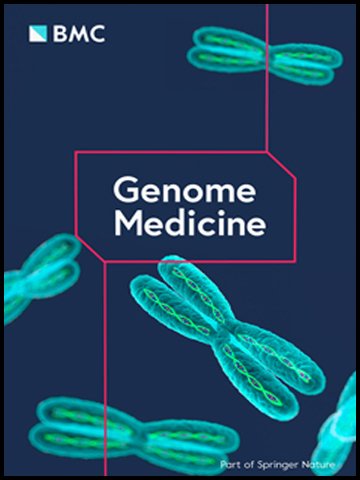鼻腔上皮细胞中与吸烟相关的基因表达改变揭示了与肺癌风险有关的免疫损伤
IF 10.4
1区 生物学
Q1 GENETICS & HEREDITY
引用次数: 0
摘要
肺癌是世界上与癌症相关的主要死因。与许多其他癌症相比,肺癌与烟草烟雾这种可改变的生活方式风险的直接联系早已确立。50%以上与吸烟有关的肺癌发生在曾经吸烟的人身上,其中40%发生在戒烟15年之后。尽管进行了大量研究,但导致肺癌风险持续存在的分子过程仍不清楚。因此,我们开始研究临床和普通人群的风险分层是否可以通过增加基因数据来改善,并探索戒烟者的持续风险机制。我们分析了 487 名受试者(包括健康志愿者和不同吸烟状况的临床患者)可获取的气道组织转录组数据。我们开发了一个计算模型来评估与吸烟相关的基因表达变化及其在戒烟后的可逆性,并将健康受试者与患有或未患有肺癌的临床患者进行了比较。我们发现,持续的吸烟相关免疫改变是临床患者的一个特征。通过使用转录网络方法整合之前的 GWAS 数据,我们证明了与已知遗传风险因素相关的基因强烈富集了相同的免疫和干扰素相关通路,从而证明了免疫改变与肺癌风险之间的因果关系。最后,我们利用可获得的气道转录组数据推导出了一种非侵入性肺癌风险分类器。我们的研究结果为普通人群种系介导的个性化烟雾损伤反应和风险提供了初步证据,对管理长期肺癌发病率和死亡率具有潜在意义。本文章由计算机程序翻译,如有差异,请以英文原文为准。
Smoking-associated gene expression alterations in nasal epithelium reveal immune impairment linked to lung cancer risk
Lung cancer is the leading cause of cancer-related death in the world. In contrast to many other cancers, a direct connection to modifiable lifestyle risk in the form of tobacco smoke has long been established. More than 50% of all smoking-related lung cancers occur in former smokers, 40% of which occur more than 15 years after smoking cessation. Despite extensive research, the molecular processes for persistent lung cancer risk remain unclear. We thus set out to examine whether risk stratification in the clinic and in the general population can be improved upon by the addition of genetic data and to explore the mechanisms of the persisting risk in former smokers. We analysed transcriptomic data from accessible airway tissues of 487 subjects, including healthy volunteers and clinic patients of different smoking statuses. We developed a computational model to assess smoking-associated gene expression changes and their reversibility after smoking is stopped, comparing healthy subjects to clinic patients with and without lung cancer. We find persistent smoking-associated immune alterations to be a hallmark of the clinic patients. Integrating previous GWAS data using a transcriptional network approach, we demonstrate that the same immune- and interferon-related pathways are strongly enriched for genes linked to known genetic risk factors, demonstrating a causal relationship between immune alteration and lung cancer risk. Finally, we used accessible airway transcriptomic data to derive a non-invasive lung cancer risk classifier. Our results provide initial evidence for germline-mediated personalized smoke injury response and risk in the general population, with potential implications for managing long-term lung cancer incidence and mortality.
求助全文
通过发布文献求助,成功后即可免费获取论文全文。
去求助
来源期刊

Genome Medicine
GENETICS & HEREDITY-
CiteScore
20.80
自引率
0.80%
发文量
128
审稿时长
6-12 weeks
期刊介绍:
Genome Medicine is an open access journal that publishes outstanding research applying genetics, genomics, and multi-omics to understand, diagnose, and treat disease. Bridging basic science and clinical research, it covers areas such as cancer genomics, immuno-oncology, immunogenomics, infectious disease, microbiome, neurogenomics, systems medicine, clinical genomics, gene therapies, precision medicine, and clinical trials. The journal publishes original research, methods, software, and reviews to serve authors and promote broad interest and importance in the field.
 求助内容:
求助内容: 应助结果提醒方式:
应助结果提醒方式:


